With 180 participants (60% up on 2012) from 23 countries (up 50%), this year’s conference further established it as a major industry meeting-place and visitors both grew in number and became more international. Lengthening the conference to three days to provide comprehensive coverage of political, industrial and scientific issues – in conjunction with Professor Dr Jörg Müssig from Bremen University of Applied Science’s Bionics Innovation Centre – proved a success.
The focus of this year’s conference was on the United States and Germany. The large number of American speakers and participants contributed to a thrilling dialogue between the world’s two leading industrial biotechnology countries.
This year’s Innovation Prizes were awarded to Newlight Technologies, LLC (USA), fischerwerke GmbH & Co. KG (Germany), and 4e solutions GmbH – ajaa! & TECNARO GmbH (Germany).
The bio-based economy is constantly gaining in importance, and the bio-based materials sector is playing a major role in this growth. The industry’s foundations are the so-called “building blocks” produced from biomass through biotechnological processes. They are used to make a large range of polymers, plastics and composites (when combined with natural fibres) that cover the entire spectrum of bio-based materials.
Policy
The first day was largely devoted to discussing the political framework that could drive the development of the bio-based economy and, above all, bio-based materials and products. From the American side, Ron Buckhalt of the U.S. Department for Agriculture (USDA) presented the strategies and possibilities for the bio-based economy. Buckhalt is the father of the USDA BioPreferredProgram, which now covers over 10,000 certified bio-based products, which receive preferential treatment over their petrochemical equivalents in public procurement. Ron Buckhalt gave an overview of US schemes to support the bio-based economy (1938 Farm Bill) and referred to the current administration’s stated desire to continue on the same path (2012 Blueprint).
The U.S. industry representative was Dr Rina Singh, Senior Director of Policy at the Biotechnology Industry Organization (BIO). She showed the bio-based economy’s huge potential in terms of volumes and turnover in the USA and gave an impressive list of examples of current investments.
The talk by Erin Simon from WWF USA sought to build bridges between industry and sustainability. She emphasized the need to find a pragmatic way of using biomass and land in a sustainable fashion, without over-promising or demonizing anyone. There is little sense in holding polarizing debates such as “paper bag v plastic bag”, and we should instead remain open to new assessments and changes in the state of knowledge whilst also keep our eyes on the dynamic bigger picture to attain sustainability.
Professor Christine Lang from the German Bioeconomy Council gave a wide-ranging presentation of schemes and strategies in the EU, Germany and a few other member states. One of Lang’s principal concerns was that there should be a public debate about “bio-based products” to avoid a similar fiasco to the low level of public acceptance of biofuels.
Dr Manfred Kirchner of Cluster Industrial Biotechnology (CLIB 2021) focused in his address on flexible raw material supplies in the bio-based economy. Dr Ricardo Gent, executive director of the German Industrial Biotechnology Association (DIB) explained how the chemical industry could contribute to the revolution in raw materials. Furthermore he appealed for better pan-European political framework conditions, particularly for material use. Ms Kristy-Barbara Lange from European Bioplastics e.V. (Berlin) pointed to the importance of communicating effectively with consumers to improve their knowledge and appreciation of bio-based plastics. Lastly, Michael Carus of nova-Institute (Germany) presented an extensive survey of the current political framework, which systematically discriminates against material use in favour of energy use. The solution could come from radical reform of the Renewable Energy Directive (RED) so that it also takes account of bio-based chemicals and plastics. The nova-Institute will shortly be publishing a paper on possible reforms.
Seldom have we witnessed such high-level debate of political strategies in the USA and in Germany between participants from the two countries. The one-hour panel discussion on the second day demonstrated that US and German companies suffer from much the same market barriers and obstacles and a similar lack of acceptance. Professor Dr Ramani Narayan (Michigan State University, USA) asked the panel how much frustration it could tolerate. All the experts had experienced hurdles and setbacks, but could see clear evidence of technical, economic and environmental progress and rising market volumes.
Industry
During the industry sessions on the first and second day, companies such as Clariant Produkte (Germany), BASF (Germany), DuPont (USA), Bayer MaterialScience (Germany), NatureWorks (USA), Johann Borgers (Germany) and FlexForm Technologies (USA) presented their plans for biorefineries, new bio-based polymers and natural-fibre-reinforced composites.
One of the main highlights was the talk given by Erwin Vink of NatureWorks (USA), which tackled the food issue with a series of new and intensive arguments that convinced his listeners the use of food crops could be a good option, if a certain number of criteria were met, not least so as to be able to use stocks flexibly during a food crisis. Vink also demonstrated a sustainability certification scheme for bio-based plastics, which NatureWorks had developed with meó -Consulting and now applies to some of its products.
Gregg Baumbaugh of FlexForm Technologies (USA) gave some insights into current developments in natural-fibre-reinforced plastics for the automotive industry. His talk detailed the entire processing chain from fibre production in Asia (jute, kenaf) through to the most cutting-edge machines used to produce natural fibre felt and moulded parts (inside door cladding, dashboards, etc.).
Michael Carus from nova-Institute (Germany) presented the latest market study of bio-based polymer capacity around the world. Current available worldwide capacity is 3.5 million tonnes, but the authors estimate that this will quadruple to almost 12 million tonnes by 2020. Bio-based drop-in PET and PE/PP polymers together with PLA and PHA show the fastest rates of market growth.
At the end of his presentation, Carus showed a video to point out the imminent development of a whole new branch of industry: the CO2 economy. Artificial photosynthesis – the chemical conversion of solar energy, CO2 and water into fuels and chemicals – is already within touching distance.
Science
This was the first time that the conference had been extended to a third, scientific day, which nova-Institute organised with the collaboration of Professor Dr Jörg Müssig from Bremen University of Applied Science’s Bionics Innovation Centre. The organisers had succeeded in bringing together 13 renowned speakers from the USA and Germany.
The bionics and biomimetics section aroused particular interest. Internationally renowned scientists such as Professor Robert O. Ritchie (University of California, USA), Professor Dr Peter Fratzl (Max Planck Institute of Colloids and Interfaces, Potsdam) and Professor Dr Thomas Scheibel (University of Bayreuth) gave presentations and showed how bio-inspired materials research and an understanding of the structuring interfaces of biological systems can optimise processes and designs for new materials.
In his talk, Professor Dr Jörg Müssig made the link between the role of natural fibres in a natural environment and optimised bio-based materials. Professor Dr Hans-Josef Endres (Institute for Bioplastics and Biocomposites at the Hannover University of Applied Sciences and Arts) gave a talk that stimulated an intense debate about terminology in the bio-based plastics sector. This discussion was then continued by Professor Dr Ramani Narayan and extended to “Life-cycle Analysis for Plastics”.
The following section was “Natural Fibres and Bio-based Composites”, which included extremely interesting and innovative presentations by Professor Anil Netravali (Cornell University, USA), Dr Gunnar Engelmann (Fraunhofer Institute for Applied Polymer Research (IAP), Germany), Professor Dr Jonathan Y. Chen (University of Texas, USA) and Professor Dr Danny Akin (Light Light Solutions, LLC, USA). Dr Akin provided the ideal introduction to the final session of the day – “Industrial Biotechnology” – with his ideas and approaches for a flax-based biorefinery. Professor Dr Norman G. Lewis (WSU Institute for Biological Chemistry, USA), Professor Dr Birgit Kamm (Research Institute Biopos, Germany) and Professor Dr Thomas Hirth (University of Stuttgart – Fraunhofer Institute for Interfacial Engineering and Biotechnology, Germany) addressed future trends in biotechnology in their presentations.
Winners of the Innovation Prize for “Biomaterial of the Year 2013”:
Newlight Technologies, LLC (USA), fischerwerke GmbH & Co. KG (Germany) and 4e solutions GmbH – ajaa! & TECNARO GmbH (Germany)
There was great interest in the awards ceremony for the Innovation Prize for “Biomaterial of the Year 2013”, which, as in previous years, was sponsored by Coperion GmbH (www.coperion.com) and, for the fifth time, conference participants voted for the winners. This prize is awarded to new practical applications of bio-based materials. Around 20 companies from the USA and Germany entered the competition.
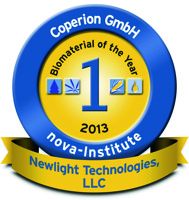 1st prize: Newlight Technologies (USA) – Airflex™ (AirCarbonTM resins)
1st prize: Newlight Technologies (USA) – Airflex™ (AirCarbonTM resins)
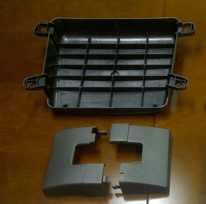 First prize, Biomaterial of the Year 2013, was awarded to Newlight Technologies, LLC for its Airflex™ (AirCarbon™) resins. CEO Mark Herrema presented a new kind of high-yield technology chain to produce thermoplastics (PHAs) from greenhouse gases (such as CO2 and methane). Newlight is using the carbon capture and polymerization technology it has developed and patented to match the performance of a wide range of oil-based plastics while out-competing them on price.
First prize, Biomaterial of the Year 2013, was awarded to Newlight Technologies, LLC for its Airflex™ (AirCarbon™) resins. CEO Mark Herrema presented a new kind of high-yield technology chain to produce thermoplastics (PHAs) from greenhouse gases (such as CO2 and methane). Newlight is using the carbon capture and polymerization technology it has developed and patented to match the performance of a wide range of oil-based plastics while out-competing them on price.
If Newlight’s technical innovation can be put to wide use, then CO2-based PHAs are on the brink of an unexpected and wholly novel breakthrough, according to experts at the conference. Company representatives are already showing considerable interest in Newlight’s Airflex™ (AirCarbon™) materials.

Mark Herrema received the trophy for first place in the Innovation Awards at the gala dinner from Uta Kühnen, representing the award’s sponsor Coperion, and thanked everyone at the conference. Mr Herrema later sent a message from the USA: “In addition to the event itself, which was great, we were honoured to win the Biomaterial of the Year award. Considering the many years of work it took to bring this material to market, my team was thrilled with the news.”
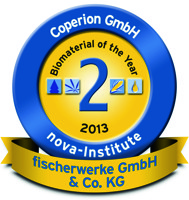 2nd prize: fischerwerke GmbH & Co.KG (Germany) – bio-PA universal UX green plug
2nd prize: fischerwerke GmbH & Co.KG (Germany) – bio-PA universal UX green plug
 Second prize at the Biomaterial Innovation Awards went to fischerwerke for its plugs made from renewable materials. Dr Joachim Schätzle, Director of Research and Technology Transfer, presented the bio-PA universal UX green plug – the first plug made from renewable raw materials. The new plug contains bio-based Polyamide from castor oil and has equal or even better performance in terms of load, temperature resistance, long-term behaviour and mechanical properties to the standard universal UX plug.
Second prize at the Biomaterial Innovation Awards went to fischerwerke for its plugs made from renewable materials. Dr Joachim Schätzle, Director of Research and Technology Transfer, presented the bio-PA universal UX green plug – the first plug made from renewable raw materials. The new plug contains bio-based Polyamide from castor oil and has equal or even better performance in terms of load, temperature resistance, long-term behaviour and mechanical properties to the standard universal UX plug.
Participants in the conference were impressed by this new bio-based and bio-inspired approach to a mass product such as a plug. They also paid tribute to this family-run market leader’s commitment to sustainability and to producing a price-competitive product.
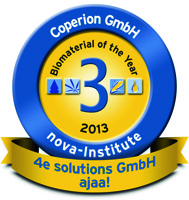 3rd prize: 4e solutions GmbH & TECNARO GmbH (Germany) – ajaa! – Sustainable household articles from bioplastics – made in Germany
3rd prize: 4e solutions GmbH & TECNARO GmbH (Germany) – ajaa! – Sustainable household articles from bioplastics – made in Germany
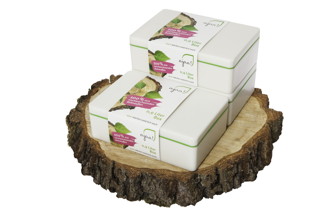 Newcomer ajaa! won over the audience at the conference and was awarded third place in the Innovation Prize. Ajaa! is the first manufacturer to offer food storage containers that are manufactured from a special biomaterial made of 100% renewable resources (sugar), supplemented by minerals and natural waxes, without any crude oil or plasticizers. The product can also be entirely recycled. The materials used are sourced locally in southern Germany and are also processed in Germany to limit transport and keep CO2 emissions low.
Newcomer ajaa! won over the audience at the conference and was awarded third place in the Innovation Prize. Ajaa! is the first manufacturer to offer food storage containers that are manufactured from a special biomaterial made of 100% renewable resources (sugar), supplemented by minerals and natural waxes, without any crude oil or plasticizers. The product can also be entirely recycled. The materials used are sourced locally in southern Germany and are also processed in Germany to limit transport and keep CO2 emissions low.
The audience awarded ajaa! third prize in recognition of a sustainable household product that has all the qualities of a conventional plastic container, i.e. it can be stacked and frozen, is dishwasher-proof and, above all, suitable for storing food.
Uta Kühnen from Coperion GmbH handed over the trophy and certificates to the winners, saying, “We are greatly honoured to be sponsoring the Innovation Prize for Biomaterial of the Year 2013. As machine-builders, we are actively involved with bio-based materials and are delighted to be able to play a part in this conference.”
Numerous conference participants praised the high quality of the presentations by world-renowned experts and the intense, interdisciplinary discussions. Participants also remarked on the pleasant atmosphere and venue – the Maternushaus in Cologne – as these provided relaxed surroundings in which people could network in peace.
The organisers nova-Institute and sponsors BIOTEC and Coperion were pleased with the significant rise in the number of participants, the lively discussions and the good atmosphere.
The theme of the next 7th International Conference on Bio-based Materials (“Biowerkstoff-Kongress”), which will be held on 8 – 10 April 2014 at the Maternushaus in Cologne, will be “Highlights from Europe”. The aim is to exceed 200 participants next time.
- Further information about the 6th International Conference 2013 on Industrial Biotechnology and Bio-based Plastics & Composites
– You can find the list of participants and exhibitors along with other information at www.biowerkstoff-kongress.de
– All conference presentations are available from now on at www.biowerkstoff-kongress.de.They are free of charge for conference participants; other interested parties will be charged €150 plus 19% VAT.
– You can download photos of conference at this link (please include the photographer’s name):
www.nova-institut.de/downloads/Biowerkstoffkongress/13-04_Bilder.zip
The zip-file includes:
- Award.jpg: Winner of the Innovation Prize for “Biomaterial of the Year 2013”: Uta Kühnen (left, Coperion GmbH), prizewinner Mark Herrema (centre, CEO of Newlight Technologies LLC, USA) and Michael Carus (right, Managing Director of nova-Institute GmbH). (Photo: Peter von Pigage, PvP-Fotodesign)
- Participants.png: Question to Prof. Dr. Christine Lang, Bioeconomy Council (Germany). (Photo: Peter von Pigage, PvP-Fotodesign)
- 1_Newlight_Technologies.jpg: Newligth’s Airflex™ (AirCarbonTM resins). (Photo: Newlight Technologies)
- 2_ fischerwerke_GmbH.jpg: Universal plug UX green. (Photo: fischerwerke GmbH & Co.KG)
- 3_ajaa!1.jpg: Sustainable household articles from bioplastics. (Photo: 4e solutions GmbH)
- 3_ajaa!2.jpg: Sustainable household articles from bioplastics. (Photo: 4e solutions GmbH)
- 1_Badge_Biomaterial_of_the_Year_2013_ Newlight_Technologies.tif
- 2_ Badge_Biomaterial_of_the_Year_2013_ fischerwerke_GmbH.tif
- 3_ Badge_Biomaterial_of_the_Year_2013_ajaa!.tif
Download this press release as PDF file: 13-05-02_pr_int_conference_bio-based_materials_nova
Source
nova-Institute, press release, 2013-05-02.
Supplier
4e solutions GmbH
ajaa!
Bioökonomierat
BIOTEC GmbH & Co. KG
Biotechnology Innovation Organization (BIO)
Clariant International AG
Cluster Industrielle Biotechnologie e.V. (CLIB2021)
Coperion
Cornell University (USA)
Deutsche Industrievereinigung Biotechnologie (DIB)
European Bioplastics e.V.
fischerwerke Artur Fischer Gmbh & Co. KG
FlexForm Technologies
Forschungsinstitut Bioaktive Polymersysteme e.V.
Fraunhofer-Institut für angewandte Polymerforschung (IAP)
Fraunhofer-Institut für Fertigungstechnik und Angewandte Materialforschung (IFAM)
Light Light Solutions, LLC
Max-Planck-Institut für Kolloid- und Grenzflächenforschung
Michigan State University
NatureWorks LLC
Newlight Technologies LLC
nova-Institut GmbH
TECNARO GmbH
Universität Bayreuth
Universität Bremen
Universität Hannover
University of Texas
US Department of Agriculture (USDA)
WWF UK
Share
Renewable Carbon News – Daily Newsletter
Subscribe to our daily email newsletter – the world's leading newsletter on renewable materials and chemicals










